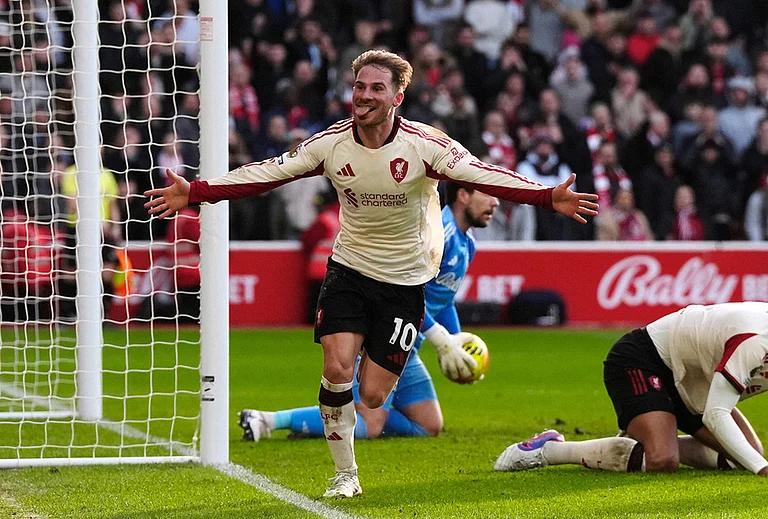The last time a German broke so many English hearts, it was the Second World War. At that time, the two nations were locked in a civilisational and ideological battle. But the arrows of time are swift, and history is quick to reconcile nations, people and ideas. This is why people across Liverpool, across England, and across the world, in fact, are mourning the departure of Jurgen Klopp — the charismatic German manager of Liverpool Football Club.
No football manager in recent history has connected with fans across the world like him. One can argue that Pep Guardiola is a better tactician, that Jose Mourinho has won more trophies, that Arsene Wenger and Alex Ferguson have better legacies, but when it comes to sheer visceral emotion generated in football fans, no one comes close to Klopp.
There are three clubs where he has left an indelible mark—Mainz 05, Borussia Dortmund and Liverpool. Mainz 05 was where he cut his teeth. He played for them for 11 years, from 1990 to 2001. For the first four years he played as a striker, and the rest as a defender. He was tall, lanky and a bang average player. A fact he was acutely aware of. He famously quipped that he had ‘fourth division feet and a first division head’. But what he lacked in skill, he made up for with a razor-sharp footballing mind. After retiring from football in 2001, he became the manager of Mainz 05. His tactics were influenced by the Italian manager Ariggo Sacchi.
What is now known as Gegenpressing is similar to Sacchi’s ideas of closing down spaces on the pitch while defending. These were the seeds for Klopp’s heavy metal style of play where players played aggressive football with a high tempo. When the ball was lost, players immediately tried to retrieve it rather than fall back and defend. The idea was to retrieve the ball as high up the pitch as possible and then attack the opposing team.
While these tactics, along with his man management, brought him some success at Mainz, it was with Borussia Dortmund that he really excelled. He won two Bundesliga titles with them and reached the Champions League final. What stood out though was the bond he created with the city and its fans. German philosopher Wolfram Eilenberger accused him of creating a cult of Klopp at Dortmund. A situation where Klopp is Dortmund and Dortmund is Klopp. A condition where Klopp is seen as the saviour, and as the messiah. Klopp dismissed these opinions in two words—Absolute rubbish.
But is it completely rubbish? The words saviour and messiah, though exaggerated, might ring true for the fans of the clubs that Klopp managed. More so in the case of Liverpool than any other club. Liverpool has historically been a working-class city. The people there brook no nonsense. They take pride in working hard. They do not believe in flash names and PR parades. So, when Klopp arrived to take charge of the struggling club (they had finished sixth in the previous season) he declared in his first press conference that he was ‘the normal one’, a humorous and humble take on Mourinho’s declaration that he was ‘the special one’.
This set the tone for his relationship with the city and its people. For him, and for the Liverpudlians, football was life and life was football. It was a match made in the footballing heavens. In the same press conference, Klopp said that he would win Liverpool their first major trophy within four years. It was a promise he kept. Not only did he win a Premier League title, but he also went on to deliver a Champions League trophy. All this while, he ferociously competed with the footballing juggernaut Pep Guardiola created at Manchester City, with almost unlimited funding at his disposal.
But a large part of Klopp’s appeal is that he is admired and appreciated by most football fans. His appeal is largely club-agnostic. How and why does Klopp generate such a groundswell of emotion? I think one of his defining traits is the absence of artificiality. In an age where every action of yours is scrutinised, dissected and debated, Klopp wears his heart on his sleeve and expresses himself in a completely natural manner, irrespective of the number of cameras trained on him.
The Premier League is the most watched football league in the world. If you are a player or a manager, there are literally millions of eyes trained upon you for those 90-odd minutes. But that does not stop Jurgen from expressing himself. He treats the dugout like a trampoline, jumping up and down in excitement, passing instructions to players with wildly flailing arms. Smiling wryly when decisions go against him. There is something in his demeanour. His body language. His toothy smile. His scowling. His angry flared nostrils. His sheer unbridled passion. His grace. His fairness. He does not particularly care about how he appears. In a day and age where managers appear on the touchlines in bespoke Savile Row suits, he still wears the humble, old tracksuit. His hair is unkempt. He usually sports a beard that is a few weeks old. There is an air of eccentric genius around him. This nonchalance endears him to all football fans.
Whenever a football match ends, whether Liverpool has won or lost, Klopp invariably goes to all players; consoling the opposite team if they have lost and celebrating with his own players. He is always there with a pat on the back, an arm around the shoulder, and his famous synced celebratory fist pumps with the crowd.
And one can see that he means every single action. No action is for show. In fact, these actions form a central part of his football and life philosophy. He believes winning is important, but what is even more important are the moments we collect along the way. After all, the trophy, though glorious, is a static shiny metal object. What is human, what is memorable, what is flesh and blood, is the moment. Like the quick corner taken by Trent Alexander Arnold in the miraculous comeback by Liverpool against Barcelona. There is no object which can denote that piece of quicksilver thinking. But these are the moments which are etched in the memory of all those who love football.
Klopp’s style of play demands a lot from the players. But his passion, his emotional investment, his complete devotion to the club take a toll on him as well. For nine years, he has served Liverpool football club with every fibre of his being.
We all want our leaders to be Teflon-coated. We forget that they are human too.
On January 26 this year, Klopp announced his departure from Liverpool to take a break from football management. He cited lack of energy as a reason. He also said that he would not manage any other club in England except Liverpool.
Klopp will leave but he will leave behind a ton of memories and trophies. Moments such as his recent interview and interaction with Daire Gorman—a 12-year-old Irish boy who suffers from Crommelin Syndrome and is a full-time wheelchair user. The grace and humour with which Klopp handled the whole situation sums him up as a human being. He made Daire feel a part of the Liverpool family. He drove his wheelchair and took him around the whole complex cracking jokes and sharing profound ideas with equal ease.
The interaction ended with them discussing how emotional both of them are about the game of football and the Liverpool anthem ‘You’ll never walk alone’. Klopp concluded the conversation by telling Daire, ‘Life without emotion, imagine how boring that would be.’
And all of us who watch the Premier League, who love football, we will now have to bear the truth of a similar statement: Life without Klopp, imagine how boring that will be.
Karan Mujoo is a Gurgaon-based writer

























